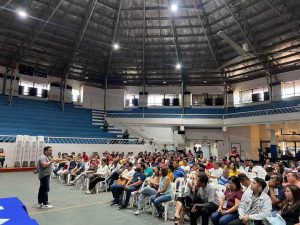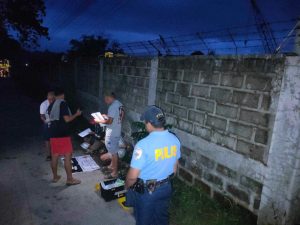The provincial government of Davao de Oro has decided to extend the implementation of the enhanced community quarantine (ECQ) instead of the general community quarantine.
On Thursday, Gov. Jayvee Tyron Uy issued an executive order fixing the schedule of the ECQ which will last until May 15.
This developed as the provincial government said it would use the period in drafting the plan that it will implement after the protocols are downgraded.
“During the transition period, Contingency Plans (CP) from different COVID-19 response clusters throughout the province shall be prepared and put in place,” the order said.
In the recent announcement from the national government, Davao de Oro was included among the local government units that were recommended to be placed under GCQ based on the recommendation of the Inter-Agency Task Force on Emerging Infectious Disease.
The executive order bared, however, that in observance with the 28-day incubation cycle, the provincial government has decided to proceed with ECQ until May 15 “to further monitor the situation at hand.”
The order also mandates that the regulations and restrictions from the previous orders on the implementation of ECQ “shall remain in full force” until 11:15 of May 15 unless sooner modified or lifted.
Uy said in a statement that the decision to continue with ECQ has been agreed by the entire Provincial Task Force on COVID-19, and was based on the suggestions of various concerned stakeholders and the medical doctors.
“We made sure that our decision is based on science and an objective one.
We cannot just make random decisions (on this) because we are talking about lives (here). We did not implement the general community quarantine recommended by the national Inter-Agency Task Force because we have seen the possible risk. There will come a time for us to implement this GCQ, but not this time,” he said.
The provincial governor pointed out the medical specialists suggested that the province has to complete the two incubation cycles before ending the ECQ and proceeding with GCQ.
“If we are going to be hasty on lifting (ECQ), there is still a threat for a second wave (of COVID-19). This means that another case will reemerge.
This is the scariest because I am sure we will go back from the start,” he added.
“This time that we no longer have infections for almost one month, let us just sustain this. Just a little bit more patience, and we will be able to finish this,” he added.
Governor Uy also pointed out that the decision to proceed with ECQ is because of the new confirmed positive case in Tagum City.
He said the ECQ in the province was supposed to end on May 7, but because of the new recorded case, the provincial government decided “to backtrack” and proceed with the original schedule of ECQ which is until May 15.
“We are working hard on our (contact) tracing so we could trace if the patient has contracted a resident of Davao de Oro or had a travel history here. Because Tagum (City) is close (to our province), we are not taking chances. We take calculated risks and we say, early lifting of the ECQ is not worth taking,” governor Uy said.
He said that Davao de Oro and Davao del Norte are intertwined provinces, where people, products, economic work, and businesses continue to pass through, stressing that it is only appropriate to have uniform policies so that there will be no conflict among the two provinces.
The governor also pointed out the concern of Mayor Sara Duterte, who also chairs the Regional Task Force XI for COVID-19, that the lifting of ECQ given the situation might just bring new cases of COVID-19 in the region.
“Currently, Davao region is the only region in Mindanao with the highest number of COVID-19 cases. We cannot afford a new set of infections,” Uy said.




